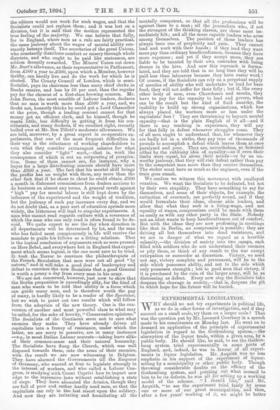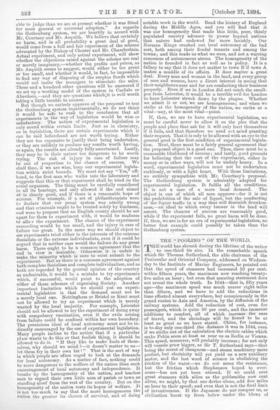EXPERIMENTAL LEGISLATION.
WHY should we not try experiments in political life, as we do in other forms of investigation, and if they succeed on a small scale, try them on a larger scale ? That was the question put by Mr. Leonard Courtney in a speech made to his constituents on Monday last. He went on to demand an application of the principle of experimental legislation in regard to the Gotbeiaburg system,—the absorption of the liquor trade, within a given area, by a public body. He should like, he said, to see the Gothen- burg system tried experimentally in some parts of England, and, indeed, he was in favour of all experi- ments in liquor legislation. Mr. Asquith was no less emphatic in his support of the experiment of liquor. selling by a municipality or other public body. Though throwing considerable doubts on the efficacy of the Gothenburg system, and pointing out what seemed to him to be its defects, he was all for setting up a working model of the scheme. "I should like," said Mr. Asquith, "to see the experiment tried fairly by some one or more of our great municipalities, and then, after a few years' working of it, we might be better able to judge than we are at present whether it was fitted for more general or universal adoption." As regards the Gothenburg system, we are heartily in accord with Mr. Courtney and Mr. Asquith. We believe that certainly no harm, and in all probability a great deal of good, would come from a full and fair experiment of the scheme advocated by the Bishop of Chester and Mr. Chamberlain. Actual experiment, and only actual experiment, will show whether the objections raised against the scheme are real or merely imaginary,—whether the profits and prices, as Mr. Asquith seems to suggest, would either be too great or too small, and whether it would, in fact, be impossible to find any way of disposing of the surplus funds which would not incite the managers to stimulate the sales. These and a hundred other questions will be answered if we set up a working model of the system in Carlisle or Aberdeen,—and they are questions which:it is well worth taking a little trouble to answer. But though we entirely approve of the proposal to test the Gothenburg system experimentally, we do not think it would be safe to rush to the conclusion that all experiments in the way of legislation would be wise or satisfactory. The notion of experimental legislation is only sound within certain limits. Just as in chemistry, so in legislation, there are certain experiments which it can be said beforehand are not worth trying. Either they are too expensive to justify their being undertaken, or they are unlikely to produce any results worth having, or again, the results are already fully ascertained. Lastly, they may be in their nature too dangerous to be worth trying. The risk of injury in case of failure may be out of proportion to the chance of success. We shall then, if we are wise, keep our experimental legisla- tion within strict bounds. We must not say "Yes," off- hand, to the first man who walks into the laboratory and suggests that this or that experiment shall be tried on the social organism. The thing must be carefully considered in all its bearings, and only allowed if the end aimed at is clearly good, and if • there is a reasonable hope of success. For example, if a set of philanthropists were t) declare that our penal system was utterly wrong and that criminals ought to be treated solely by kindness, and were to propose that an English county should be set apart for them to experiment with, it would be madness to allo v the experiment. The chance of the experiment succeeding would be too small, and the injury in case of failure too great. In the same way we should object to see experiments tried either in the interests of the extreme Socialists or the extreme individualists, even if it could be argued that in neither case would the failure do any great harm. There ought to be a common agreement that the end in view is desirable. Otherwise it is unfair to make the minority which is sure to exist submit to the experiment. But as there is a common agreement against both complete Socialism and complete individualism, and as both are regarded by the general opinion of the country as undesirable, it would be a mistake to try experiments which, if successful, would point to the adoption of either of those schemes of organising Society. Another important limitation which we should put on experi- mental legislation is that the demand must not be a merely local one. Nottingham or Bristol or Kent must not be allowed to try an experiment which is merely wanted by the local majority. For example, Leicester should not be allowed to try the experiment of doing away with compulsory vaccination, even if the evils arising from failure could be confined within her own boundary. The pernicious ideal of local autonomy must not be in- directly encouraged by the use of experimental legislation. Many people incline to the notion that if a particular place wants to do this or that foolish thing, it should be allowed to do it. "If they like to make fools of them- selves, why should we mind ?—it doesn't matter to us— let them fry in their own fat ! " That is the sort of way in which people are often urged to look at the demands for local autonomy. As a matter of fact, nothing could be more dangerous to the welfare of the nation than such encouragement of local autonomy and independence. It breaks up the homogeneity of the nation, and teaches men to regard their own little area of parish or town as standing aloof from the rest of the country. But on the homogeneity of the nation rests its hopes of welfare. It is not too much to say that the more homogeneous the nation the greater its chance of survival, and of doing notable work in the world. Read the history of England during the Middle Ages, and you will find that it was our homogeneity that made this little, poor, thinly populated country advance in power beyond nations that nature had endowed far more lavishly. Our Norman Kings crushed out local autonomy of the bad sort, both among their feudal tenants and among the towns ; and this made us what we were, and not a warring concourse of autonomous atoms. The homogeneity of the nation is founded in fact as well as in policy. It is a fallacy to say that it does not matter to town B if town A makes a muddle of its affairs. It does matter a great deal. Every man and woman in the land, and every group of men and women, have a direct interest in seeing that their neighbours near and far are conducting their business properly. Even if we in London did not catch the small- pox from Leicester, it would be a terrible evil for London to have Leicester struck down by the plague. Whether we admit it or not, we are homogeneous ; and when we strike at the homogeneity of the nation, we strike at a vital—nay, at the most vital—point.
If, then, we are to have experimental legislation, we must be careful never to allow it on the plea that the people and place that ask for it will only hurt themselves if it fails, and that therefore we need not mind granting their request. That it is only to be allowed with an eye to the general good is the first condition of experimental legisla- tion. Next, there must be a fairly general agreement that the proposed object is a good one. Then, there must be a reasonable likelihood of success ; and lastly, good grounds for believing that the cost of the experiment, either in money or in other ways, will not be unduly heavy. In a word, experimental legislation must not be undertaken recklessly, or with a light heart. With these limitations, we entirely sympathise with Mr. Courtney's proposal. The Gothenburg system is admirably adapted for experimental legislation. It fulfils all the conditions. It is not a case of a mere local demand. The object is one of which all men approve—for it is not the prohibition of the sale of liquor, but the conducting of the liquor traffic in a way that will diminish drunken- ness,—an ideal to which every brewer in the land will assent. The chances of success are reasonably good, while if the experiment fails, no great harm will be done. If, then, we are in for an era of experimental legislation, no better first example could possibly be taken than the Gothenburg system.







































 Previous page
Previous page